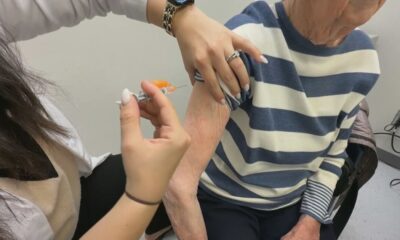Entertainment
Researchers Advocate for Baby Consent During Diaper Changes

Early childhood researchers in Australia are urging parents to seek “consent” from their babies before changing their diapers. The recommendation comes from a guide authored by Katherine Bussey and Nicole Downes, a research fellow and lecturer, respectively, at Deakin University. In their November 2025 publication, they emphasize the importance of helping children understand what is happening during diaper changes, stating, “At the start of a nappy change, ensure your child knows what is happening.”
The researchers suggest that parents should engage with their infants by getting down to their level and informing them, “You need a nappy change,” followed by a pause for the baby to absorb the information. This approach aims to normalize the concept of consent, integrating it into everyday interactions.
Rethinking Diaper Changes
Traditionally, changing a diaper is a routine task, often completed quickly. However, Bussey and Downes argue it should be an opportunity for teaching about consent and bodily autonomy. They propose that once parents have communicated the need for a diaper change, they should observe the baby’s facial expressions and body language to determine if the child comprehends the situation.
After establishing this understanding, parents can offer choices, such as asking, “Do you want to walk or crawl with me to the change table, or would you like me to carry you?” By involving babies in this way, the researchers contend that children learn what is acceptable regarding their bodies and enhance their safety against potential abuse.
According to the authors, “These habits plant the seed of the idea that a child has the right to say what happens to their body.” This foundational understanding is intended to empower children as they grow, making them more aware of their bodily autonomy.
The Importance of Language
In addition to seeking consent, the researchers highlight the significance of using proper anatomical terminology. They advocate for the use of terms such as “vulva,” “penis,” and “anus,” instead of colloquial names like “pee-pee” or “bum-bum.” By using precise language, parents equip their children with the vocabulary necessary to communicate effectively about their bodies, thus enhancing their safety.
“Parents may feel uncomfortable doing this and think more childish names should be used, but this keeps children safe as it means they can then inform trusted adults about their experiences with all the people who care for them,” the guide explains.
Furthermore, the researchers encourage parents to foster a sense of independence by providing children with choices in everyday situations. Allowing kids to select their clothing, snack options, or even outings can nurture their decision-making skills and reduce potential power struggles.
The call for a shift in how parents approach diaper changes reflects a broader movement toward emphasizing consent and autonomy in early childhood development. By adopting these practices, parents can contribute to a culture that respects individual boundaries from the earliest stages of life.
This initiative resonates with ongoing discussions about parental roles and child safety, aiming to equip future generations with the tools to advocate for themselves effectively.
-

 Politics2 weeks ago
Politics2 weeks agoSecwepemc First Nation Seeks Aboriginal Title Over Kamloops Area
-

 World4 months ago
World4 months agoScientists Unearth Ancient Antarctic Ice to Unlock Climate Secrets
-

 Entertainment4 months ago
Entertainment4 months agoTrump and McCormick to Announce $70 Billion Energy Investments
-

 Lifestyle4 months ago
Lifestyle4 months agoTransLink Launches Food Truck Program to Boost Revenue in Vancouver
-

 Science4 months ago
Science4 months agoFour Astronauts Return to Earth After International Space Station Mission
-

 Technology3 months ago
Technology3 months agoApple Notes Enhances Functionality with Markdown Support in macOS 26
-

 Top Stories1 month ago
Top Stories1 month agoUrgent Update: Fatal Crash on Highway 99 Claims Life of Pitt Meadows Man
-

 Sports4 months ago
Sports4 months agoSearch Underway for Missing Hunter Amid Hokkaido Bear Emergency
-

 Politics3 months ago
Politics3 months agoUkrainian Tennis Star Elina Svitolina Faces Death Threats Online
-

 Politics4 months ago
Politics4 months agoCarney Engages First Nations Leaders at Development Law Summit
-

 Technology4 months ago
Technology4 months agoFrosthaven Launches Early Access on July 31, 2025
-

 Top Stories4 weeks ago
Top Stories4 weeks agoFamily Remembers Beverley Rowbotham 25 Years After Murder



















